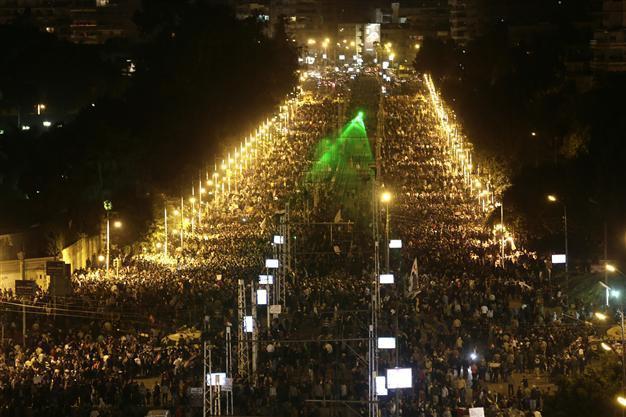Egypt military demands dialogue to end crisis
CAIRO - Agence France-Presse

AP Photo
Egypt's powerful military thrust itself into the political crisis dividing the nation on Saturday demanding dialogue and warning it would not permit events to take a "disastrous" turn.
"The path of dialogue is the best and only way to reach agreement and achieve the interests of the nation and its citizens," said a statement from the armed forces -- the first since street protests against President Mohamed Morsi erupted more than two weeks ago.
"The opposite of that will take us into a dark tunnel with disastrous results -- and that is something we will not allow." The stark ultimatum underlined the seriousness of the crisis pitting Morsi and his Islamist backers against the largely secular opposition alarmed at his expanded powers and efforts to push through a new constitution.
Nightly protests degenerated into clashes this week between Morsi supporters and opponents leaving seven people dead and more than 640 injured. That prompted the army to deploy tanks outside the presidential palace on Thursday to prevent further bloodshed.
The military underlined in its statement that it would maintain its role safeguarding the nation's security, pointedly not taking sides.
"The military establishment stands always with the great Egyptian people and insists on its unity," it said.
"We confirm that we support national dialogue and the path of democracy... to bring together all factions in the country." The military's refusal to become embroiled in political disputes recalled its hands-off position during the uprising that toppled president Hosni Mubarak early last year.
The statement contradicted an ominous report in the state newspaper Al-Ahram on Saturday which said Morsi's cabinet had approved a draft law allowing soldiers to arrest civilians to maintain public order, but that Morsi had not yet signed it.
The president has struck a defiant public tone against the protests, defending both his decree and the referendum.
But in the past couple of days his Islamist-led camp has also made some conciliatory gestures to the mainly secular opposition.
Morsi himself offered late Thursday to hold talks with the opposition, but that was rebuffed the next day by the National Salvation Front coalition ranged against him.
One of the Front's leaders, Mohamed ElBaradei, a former UN atomic agency chief and Nobel Peace laureate, stressed late Friday that dialogue could only happen if Morsi first postponed the referendum and repealed his decree placing his decisions beyond judicial review.
Vice President Mahmud Mekki said Morsi "could accept to delay the referendum," but only if the opposition guaranteed it would not exploit the legal breach inherent in pushing it back.
Early voting in the referendum for Egyptians abroad has been pushed back four days to Wednesday.
Additionally, on Saturday the Cairo prosecutors' office told AFP that all 133 people arrested during Wednesday's clashes had been released.
And Mohammed Badie, leader of the Muslim Brotherhood, which backed Morsi in the June presidential election, gave a news conference renewing the call for dialogue but insisting that the "legitimacy" of the president's decisions be respected.
The opposition fears Morsi's "power grab" and referendum aim to push the country towards a more Islamic state, based on the slender mandate he won in June.
Morsi's backers in the Muslim Brotherhood, in turn, fear that the judiciary, with its many Mubarak-era appointees, is plotting to block their post-Mubarak reforms.
















